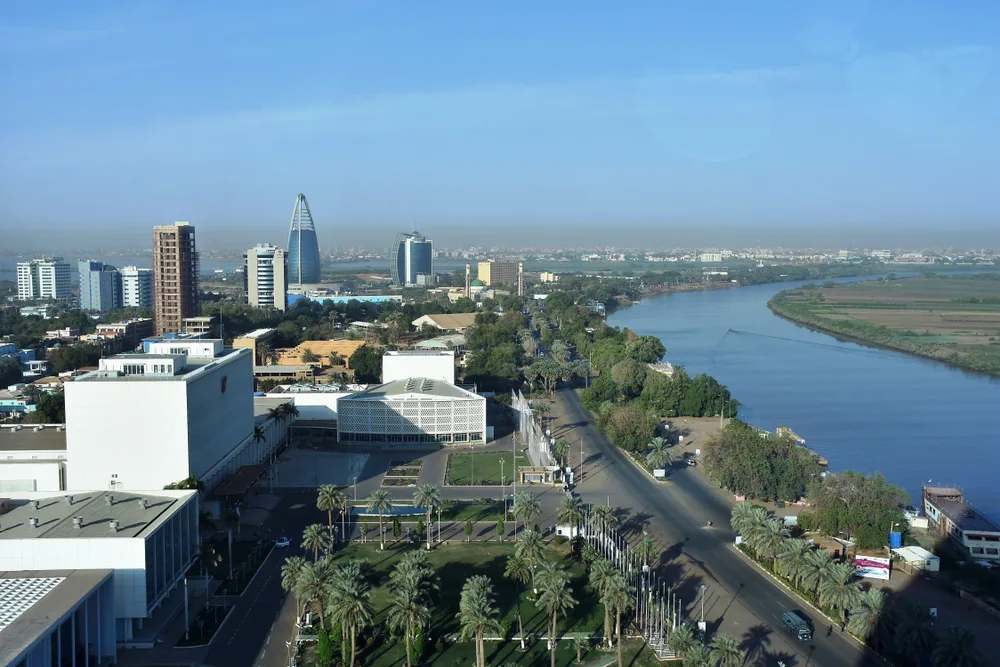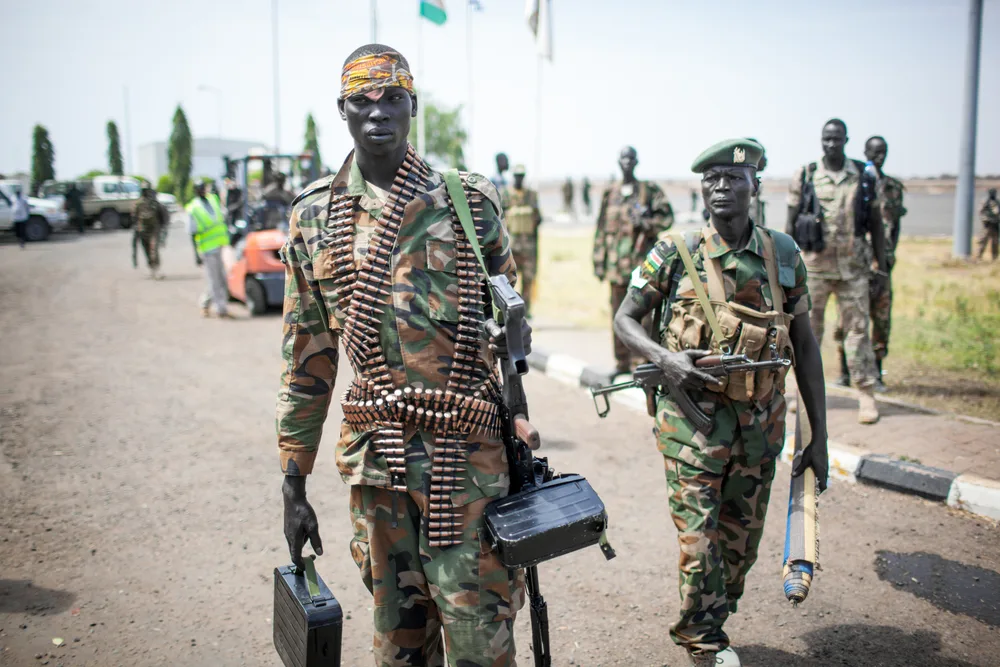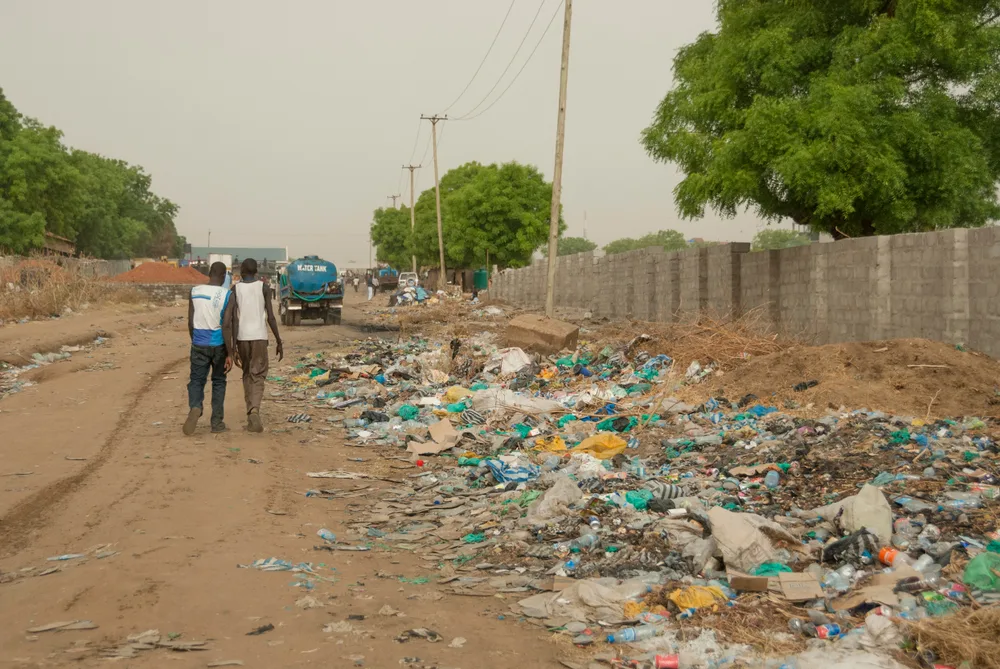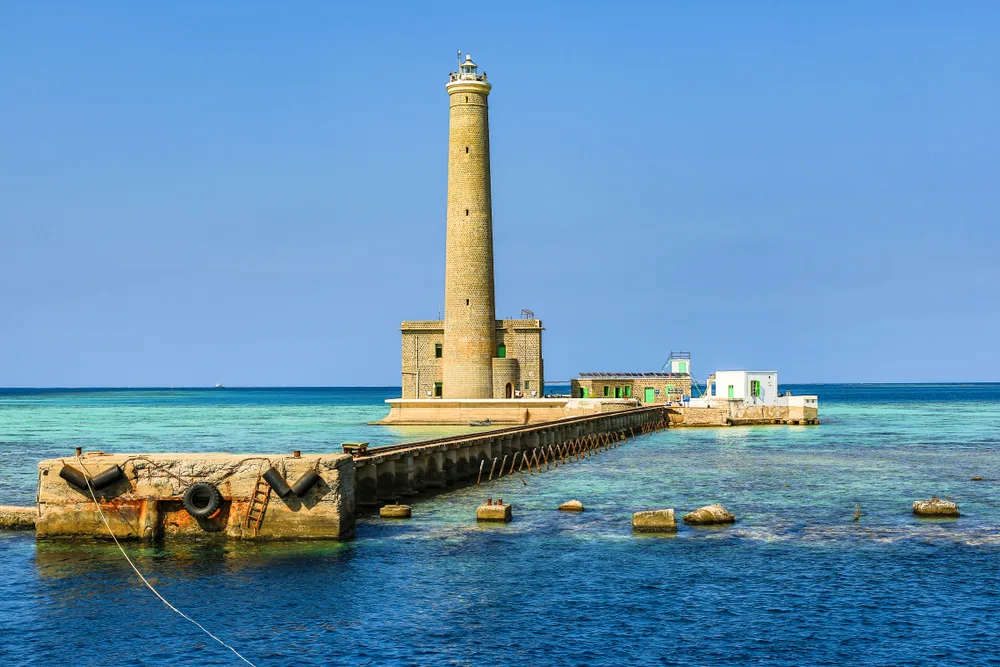Mysterious Sudan is an off-the-beaten-path gem in Eastern Africa. The country has a rich history dating back to ancient times. While Egypt’s pyramids are more famous, Sudan actually has more pyramids, remnants of the powerful ancient Nubian kingdom.
Besides the pyramids at Meroe, Sudan has many other beautiful attractions, such as the pristine Sanganeb National Park on the Red Sea, Tuti Island on the Nile, and more.
Visitors who venture to this country love discovering the rich culture and amazing hospitality. Going pyramid-exploring and seeing some untouched nature in one of Africa’s largest countries certainly is a tempting idea.
But is Sudan safe to visit? Here’s our take.
Is Sudan Safe to Visit in 2025?

Khartoum, Sudan – November, 18, 2017: Aerial view of View of the Nile and Tuti island/Claudiovidri/Shutterstock
No. Sudan is not very safe to visit right now. Certain regions of the country have widespread armed conflict, and civil unrest can occur anywhere due to dissatisfaction with the military government.
In certain regions, violent crime, including the kidnapping of foreigners for ransom, is widespread. That being said, adventurous tourists still come to Sudan.
International travel advisories don’t seem to agree on the level of threat when visiting Sudan. The United States has a “Level 4: Do Not Travel” warning in place for all of Sudan.
Other governments, such as New Zealand, advise against all travel for certain regions and all but non-essential travel for the rest of Sudan.
The United Kingdom is the most optimistic, giving travelers the green light for certain regions such as the capital Khartoum, although advising people to read the government travel advisory first.
All governments are united in advising people not to travel to certain regions in Sudan, with good reason. You shouldn’t travel near any of Sudan’s land borders due to ongoing conflicts either between Sudan and its neighbors or within neighboring states that bleed over.
You should also avoid traveling to certain provinces, such as Darfur. The war in Darfur started in 2003 and has been ongoing for the past 20 years, with many calling it the 21st century’s first genocide.
Violent killings still happen, many people are displaced, and the instability has made the region a hotspot for violent crime. Unrest in Sudan is not confined to a few regions, unfortunately.
In 2018, protests erupted in Sudan against long-time dictator Omar al-Bashir and his corrupt, undemocratic government. Although Al-Bashir was ousted in 2019, violent crackdowns continued for the next few years resulting in the massacres of many protesters.
In 2021, the situation grew worse due to a military coup. Although the military promised to transition to a democratic government, the situation in Sudan is still unstable. Protests are ongoing in the country and could erupt at any time.
The government, whoever happens to be in power at the moment, usually responds with violence. In January 2023, there were renewed protests in Khartoum that were met with state violence.
Demonstrations can happen at any time and turn violent, so avoid crowds while in Sudan. After learning about the political situation in Sudan, you might realize that crime is the least of your worries.
However, it’s worth touching on it. Anecdotal evidence from other travelers says that petty crime in Sudan, such as pickpocketing and mugging, is actually quite low.
Unfortunately, violent crimes such as terrorist attacks and kidnappings are more common. Although these crimes are more common in regions with high levels of unrest, such as Darfur, they also happen throughout the rest of the country.
It’s also worth mentioning potential natural disasters you might encounter while in Sudan. The temperatures can get very high while in the country, so be ready if you are traveling in the summer. Insect-borne diseases and other pandemics are common.
To recap, the main concerns for tourists visiting Sudan are:
- Civil unrest
- Armed conflict
- Terrorism
- Kidnapping
- Disease
There are parts of Sudan that are possible to visit with less trouble, but most people decide that the risk is not worth it.
Crime in Sudan

Paloch, South Sudan – March 2, 2014: A South Sudanese soldier carries a machine gun/Punghi/Shutterstock
Crime rates in Sudan are not that bad, which surprises many people who assume that the country is full of danger. Most of the danger comes from political violence or military conflict, not ordinary criminals or criminal groups.
For example, the homicide rate in Sudan as of 2015 is 6.5 incidents per 100,000 people. That is below the global average. People die in Sudan due to conflict and displacement, but usually not because of murders or neighbors killing neighbors.
Surveys of public opinion show that people aren’t very concerned about crime. According to Numbeo, the crime that people in Sudan worry about the most is corruption and bribery, with 80.32% saying that this is a problem.
People are only moderately concerned about theft and not concerned at all about violent crime. Stories from other travelers, especially visitors to Khartoum, agree that levels of petty crime are low.
Although crime has been increasing slightly over the past few years, probably due to the instability of the country’s situation, it is still low.
The only noticeable increase in crime is in vehicle break-ins, but you can avoid that by hiding your valuables in your vehicle. More serious crimes do occur in Sudan. Terrorist attacks occur sporadically throughout the country.
Of violent crimes, kidnapping is the most serious. Groups often target foreigners, such as aid workers, with the hope of getting ransom or leverage.
Although most incidents of kidnapping and banditry are focused in violence-ridden regions such as Darfur, they do occur throughout the country. You may not have to be on your guard against theft in Sudan, but you should be careful of these more dangerous crimes.
Terrorism
Decades of political instability in Sudan made it possible for terrorism to become more prevalent. Although the Sudanese government is no longer on the United States State Department’s official list of government sponsors of terrorism, incidents still occur.
According to the Global Terrorism Database, terrorist incidents in Sudan drastically decreased after 2016 but saw a slight uptick after 2019.
The instability following the years of protests and military coups created a fertile environment for terrorist groups to try to increase their activities. Incidents have been sporadic but high-profile, such as a terrorist shoot-out in Gabra in 2021.
Governments such as Australia warn their citizens about the high risk of terrorist attacks in Sudan.
Many groups target places where foreigners gather because they are motivated by an anti-Western sentiment, fueled even further by the decades-long presence of Western UN troops in Sudan.
Frequent targets are places of worship, transportation hubs, shopping malls, and hotels and restaurants known as ex-pat hangouts. There’s not much you can really do to prevent terrorism by yourself as this crime is, by definition, random and can affect you anywhere (even in your home country).
Monitor local news and warnings to see if there is a predicted uptick in terrorist activity. Avoid large crowds (also due to the threat of civil unrest) and traveling outside of safe areas at night.
Kidnapping
Another violent crime that commonly occurs in Sudan is kidnapping. Terrorists and other armed groups frequently kidnap people to use as hostages.
High-profile kidnapping incidents include the kidnapping of two Turkish engineers in Darfur in December 2021 and kidnapped farmers in 2022. Locals and foreigners can be victims of kidnappings.
Some groups target Westerners with purpose because they know foreigners have more money than most Sudanese and will provide more leverage in terms of ransom and hostage negotiations. There have been cases of aid workers and other ex-pats being targeted.
As with most violent crimes, Darfur is the region that sees the most kidnappings. However, this problem has started to bleed into the rest of Sudan.
The United Kingdom warns its citizens about the threat of kidnapping, as do other countries. The best way to protect against kidnapping is to be careful about your movements.
Make sure you are not traveling a predictable route and going through unsafe areas alone. That might make you a target. If you venture outside of Khartoum or urban areas, make sure you are not going alone, as kidnappings often happen in rural regions or on roads.
Keep in mind that many governments have limited consular support in Sudan as well as a long-standing policy not to negotiate with kidnappers, so don’t rely on your government to bail you out of trouble.
Avoiding Bad Areas

JUBA, SOUTH SUDAN – FEBRUARY 27 2012: Unidentified people pass by rubbish dump on a street in Juba, South Sudan. Recycling of plastic waste is a major problem for most African countries/Vlad Karavaev/Shutterstock
The security situation in Sudan varies drastically from region to region. Knowing which regions to avoid can help you stay safe. Avoiding all of Sudan’s land borders is a good idea.
Sudan still has border disputes with South Sudan and with Egypt. Violence in Libya sometimes bleeds through at the border, so that’s another region to avoid. Due to the war in Tigray, avoid the area near the Ethiopian and Eritrean borders as well.
Certain regions of Sudan have been locked in conflict for decades. Darfur is the most famous and the most volatile, but Abyei, South Kordofan, Blue Nile, and West Nile states also see a lot of violence.
In most of these regions, the population identifies as Black South Sudanese and is in conflict with the Sudanese, often Arab, government. South Kordofan and Blue Nile were even excluded from participating in the referendum on joining South Sudan.
Some governments advise their citizens to avoid Khartoum as well due to the threat of political protests and civil unrest.
Things to Consider
Here are some other safety tips to keep in mind when visiting Sudan:
- Internet and cell phone service is sporadic, and the government sometimes turns it off when there is a protest.
- Roads in Sudan are not well-maintained, and accidents happen often. Be careful when traveling in between cities.
- Be careful when traveling outside of urban areas, as landmines are still a problem in a lot of regions—and many are unmarked.
- You need a permit to take any photographs in Sudan, and taking photos of certain objects, such as infrastructure and military installations, is illegal even with a permit.
Frequently Asked Questions

Pommeyrol Vincent/Shutterstock
Here are some other things people want to know about Sudan:
Is Sudan safe to visit now?
Civil unrest in Sudan has continued into 2023. Most of the country is not safe to visit now, and few people want to risk traveling there at all.
Which part of Sudan is safe to visit?
Areas near the Red Sea coast and around the capital Khartoum are mostly safe to visit. However, make sure you are using up-to-date information. Some sites claim that the Ethiopian border is safe to visit, but that is not the case ever since the start of the war in Tigray.
Can you drink alcohol in Sudan?
Alcohol is mostly illegal in Sudan. Recent changes to the law made it legal for non-Muslims to drink alcohol as long as they are not in the presence of Muslims, but the exceptions are so narrow it’s not worth testing the boundaries for a beer.
Is Khartoum a safe city?
In terms of the danger you would expect in a major city, such as muggings, petty theft, and break-ins, Khartoum is a remarkably safe city. It is also one of the safer parts of Sudan. However, it is often the site of protests that are violently suppressed by authorities.
Is Sudan still at war?
Regions of Sudan are still at war with active separatist or anti-government movements. Due to the instability of the central government, it doesn’t look as if any of those conflicts will be resolved any time soon.
So, Is Sudan Safe to Visit in 2025?
Sudan is not the safest place to visit right now. Many regions are embroiled in active conflict, including Darfur. Political unrest increased after the 2021 military coup. The instability makes it easy for groups to carry out terrorist attacks and kidnapping attempts targeting foreigners.
With all those dangers in mind, if you are an adventurous tourist who takes the right precautions and only visits safe areas, you will come out of Sudan with a story to tell. Happy travels!



